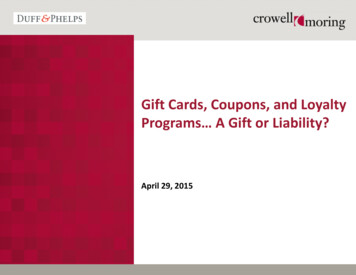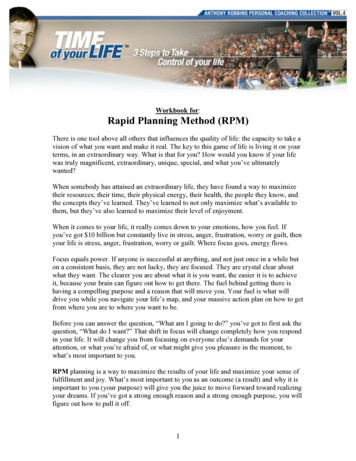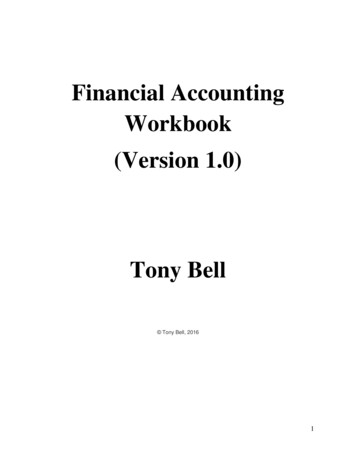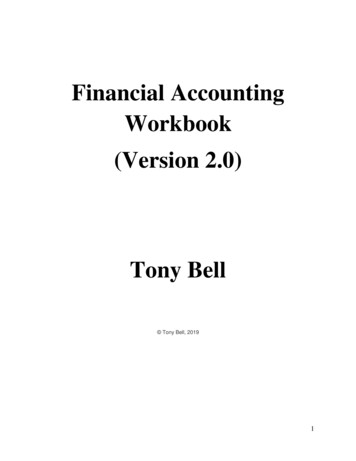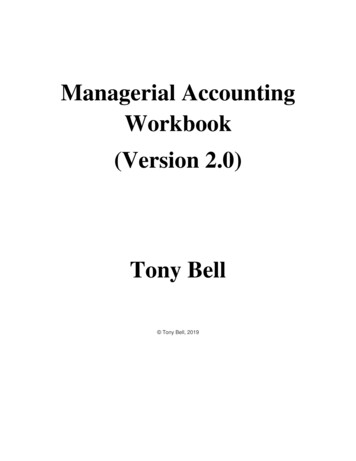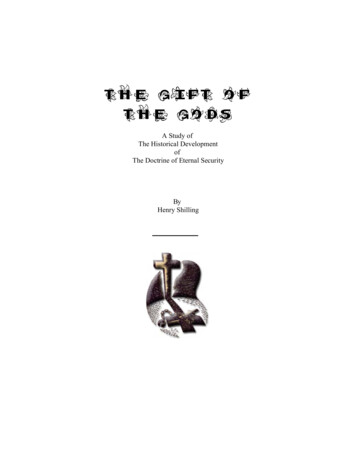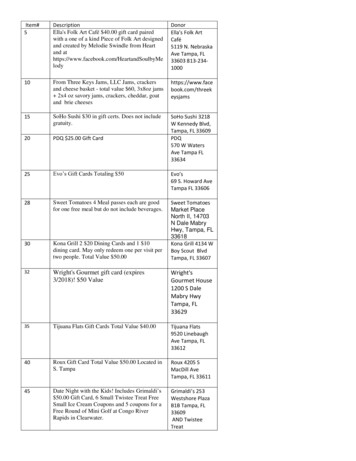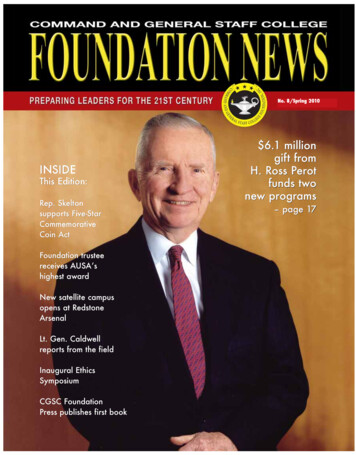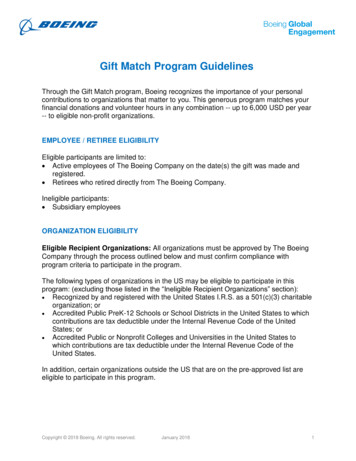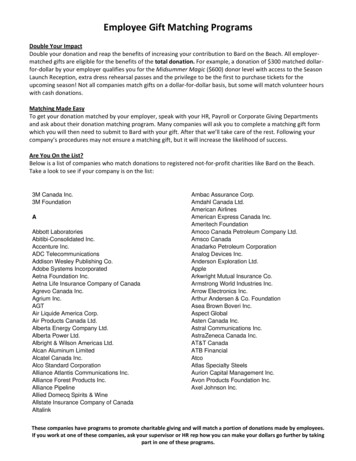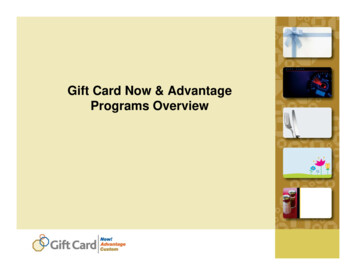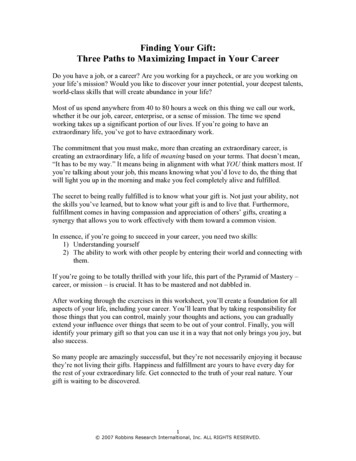
Transcription
Finding Your Gift:Three Paths to Maximizing Impact in Your CareerDo you have a job, or a career? Are you working for a paycheck, or are you working onyour life’s mission? Would you like to discover your inner potential, your deepest talents,world-class skills that will create abundance in your life?Most of us spend anywhere from 40 to 80 hours a week on this thing we call our work,whether it be our job, career, enterprise, or a sense of mission. The time we spendworking takes up a significant portion of our lives. If you’re going to have anextraordinary life, you’ve got to have extraordinary work.The commitment that you must make, more than creating an extraordinary career, iscreating an extraordinary life, a life of meaning based on your terms. That doesn’t mean,“It has to be my way.” It means being in alignment with what YOU think matters most. Ifyou’re talking about your job, this means knowing what you’d love to do, the thing thatwill light you up in the morning and make you feel completely alive and fulfilled.The secret to being really fulfilled is to know what your gift is. Not just your ability, notthe skills you’ve learned, but to know what your gift is and to live that. Furthermore,fulfillment comes in having compassion and appreciation of others’ gifts, creating asynergy that allows you to work effectively with them toward a common vision.In essence, if you’re going to succeed in your career, you need two skills:1) Understanding yourself2) The ability to work with other people by entering their world and connecting withthem.If you’re going to be totally thrilled with your life, this part of the Pyramid of Mastery –career, or mission – is crucial. It has to be mastered and not dabbled in.After working through the exercises in this worksheet, you’ll create a foundation for allaspects of your life, including your career. You’ll learn that by taking responsibility forthose things that you can control, mainly your thoughts and actions, you can graduallyextend your influence over things that seem to be out of your control. Finally, you willidentify your primary gift so that you can use it in a way that not only brings you joy, butalso success.So many people are amazingly successful, but they’re not necessarily enjoying it becausethey’re not living their gifts. Happiness and fulfillment are yours to have every day forthe rest of your extraordinary life. Get connected to the truth of your real nature. Yourgift is waiting to be discovered.1 2007 Robbins Research Internaltional, Inc. ALL RIGHTS RESERVED.
I. Creating Your Life’s Mission StatementIn the audio portion of “Find Your True Gift,” author Stephen Covey expresses theimportance for every business, or enterprise, to have a Mission Statement; what thatenterprise is going to be about.The same holds true as you formulate a vision for your career. Work on your work byworking on yourself first. Think of yourself as an enterprise, an entity that one day willgo from private to public, from your vision of what you want to do to actually doing it.Having a vision of what you want to create is essential to where that enterprise will go.However, there are four basic elements involved in creating an environment thatfunctions effectively toward an enterprise’s goals:1) Physical well-being (including economics) – the principle of fairness; fairness toothers and to yourself so that basic needs are met.2) Social (relationships) – the principles of kindness, dignity, and respect for others;a culture where conflict can be resolved equitably.3) Psychological – the principle of growth; identifying, developing and using talents.4) Spiritual – the principle of contribution. Are you making a difference? Do youadd value?Our lives center on these basic themes. However, underneath lies a core set of principles,or basic truths, that are enduring and never change. An example of an enduring principleis the Golden Rule: do unto others as you would have them do unto you.Tying your identity and your role within all relationships to a set of principles, rather thanto a set of responsibilities, gives you freedom and flexibility to recognize and adapt tosituations for what they are, while still maintaining a sense of purpose toward your visionand knowing what really matters most within that vision.Your True North PrinciplesImagine a compass. No matter where you are or which direction you’re moving in, truenorth never changes. Likewise, principles never change. On the other hand, values areinternal and subject to change. What we value today may have no value next weekbecause something in the environment changed. Think about it: when Beta home videorecorders first hit the market, they were all the rage, but do they have any value now?Our value system is manifested in our habit patterns. The key to changing a habit patternthat brings anything less than fulfillment is to get your value system, the things thatmatter to you most (the arrow of the compass), in alignment with your principles: truenorth. When your values and principles are in alignment, the vision of your life, and allareas within it, including work, becomes clearer.2 2007 Robbins Research Internaltional, Inc. ALL RIGHTS RESERVED.
ExerciseCreate a core set of principles and a vision of your life’s work into a Mission Statement.You’re not only creating the soul of your career, but the center of your life.I. First, what is it that you value most in life? Is it money, relationships, respect,recognition, fairness? Go into your heart and examine your motives. What are you reallyabout? Write down all the things that are important to you.II. Second, what are your core principles, basic truths that will apply to all areas of yourlife, a system that will inform the actions you take and how you respond to life’s joys andchallenges? Examples are listed below, but feel free to come up with your own!1. Gratitude2. Kindness3. Compassion (forgiveness)4. Charity5. Productivity6. Effectiveness7. Courage8. Justice (fairness)9. Cheerfulness10. WisdomIII. Finally, create a Mission Statement for your life. Think of it this way: what wouldyou want written on your gravestone? How would you want to be remembered? Useadditional paper if necessary.My life is going to be about3 2007 Robbins Research Internaltional, Inc. ALL RIGHTS RESERVED.
II. The Private Victory: Responsibility, Mission, and ActionIn his best-selling book The Seven Habits of Highly Successful People, author StephenCovey states that we are not merely stimulus response beings. We can choose the way tolive, and that having a set of correlating principles and values creates the foundation ofcontribution and interdependence, components of healthy relationships of all types,including the relationships you will form toward achieving your ideal career.To know what your gifts are, and to know how they can be used to contribute not only toa fulfilling life for yourself but for the sake of others, you first have to take ownership ofthe course of your life. Private victories always precede public victories.Exercise1) Pro-activity – Take responsibility for your life and careerWe have a space between what happens to us and our response to what happens to us. Wecan choose our attitude and responses no matter what the circumstances. For example, ifyou’ve just been laid off from a job, you have the choice to take that as bad luck, or youcan choose to take that as an opportunity to find your real life’s mission.Take a few moments to think about what kind of career would make you feel truly aliveeveryday. What would that career be? What would you be doing?2) Mental/Spiritual Creation –What your career is going to be aboutGo back to your Mission Statement and correlate that to the career that you envision foryourself. Begin with the end in mind.This is the “Why” portion of your goals. Why do you want this career? What is yourcareer going to be about? How will it add value to others? Are you willing to go thedistance to get the career you want? What principle(s) enforce this determination?4 2007 Robbins Research Internaltional, Inc. ALL RIGHTS RESERVED.
3) Live by it – Put it into practiceOnce you have a vision of your career, which is organized around your values andprinciples, execute actions around central priorities with discipline and commitment.What one or two actions can you take immediately to get yourself away from a careerthat is not fulfilling and not centered around your principles, and into a career that notonly utilizes your true gift but uses it in a way that matches your principles?5 2007 Robbins Research Internaltional, Inc. ALL RIGHTS RESERVED.
III. Circle of InfluenceImagine two circles: the smaller inside the larger. These are the Circles of Influence. Theouter circle has to do with everyday concerns, things you may or may not have controlover, and the inner circle is made up of the things you do have some if not total controlover (changing your attitudes, thoughts, behaviors, or that of others). This inner circle isyour Circle of Influence.Exercise:Think of all the things right now that aren’t quite the way you want them to be and wouldlike to somehow change. Separate these challenges into three categories:1) Those things that you have direct control over, i.e. yourself; changing how you view asituation, changing how you respond to situations. For example, instead of responding toa perceived insult with anger, what other emotions could you respond with?2) Those things you have indirect control over, i.e. influencing the behavior of others. Inthe audio portion, Stephen Covey mentioned an example of doing chores around thehouse instead of complaining about somebody else not doing them, and then later havinga talk about it. If you’d like to influence the behavior of someone but it’s not working,what can you do different than what you’ve been doing but doesn’t seem to work?3) Those things you have no control over: for example, being unexpectedly laid off froma job due to cuts. What are those things in your life right now that you perceive not beingable to change through your direct influence?6 2007 Robbins Research Internaltional, Inc. ALL RIGHTS RESERVED.
Exercise: Expanding your Circle of influenceIn the smaller circle below, write down those things you have direct control over. In theouter circle, write down those things you perceive to have no control over.Focus on those items within the inner circle for a week. After a week, or whatever timeperiod is long enough for you to gauge results, examine and write down any changes toboth inner and outer circles. Also, write down what things you did that may have had aneffect on that change.7 2007 Robbins Research Internaltional, Inc. ALL RIGHTS RESERVED.
IV. The Public Victory: Respect, Communication, and SynergyEarlier we took a look at the first three of Stephen Covey’s Seven Habits of HighlyEffective People, which are taking responsibility for your life (or any given situation),having a purpose or mission that keeps the goal in mind, and taking action toward thatgoal. These three items comprise the Private Victory, where you take ownership ofyourself first before having an effect upon your environment.The next three of Covey’s habits comprise the Public Victory, which are:4) Respect – Regard other people with respect and dignity, with the understanding thatwhatever the problem or challenge, a win/win scenario is preferable to anything else(win/lose, lose/lose). To achieve a common vision or goal, cooperation is more effectivethan competition.5) Listen – Seek to listen and understand before you seek to be listened to andunderstood. Most people listen with the intent to reply, not with the intent to understand.The purpose is to get inside the head of the other and empathize with their view of thesituation and of the world. It’s not even really to agree. Understanding means givingpeople psychological air. It’s the ultimate affirmation of another person. It shows that youvalue their perceptions and feelings. Their defenses are lowered, and they stop fightingyou.6) Developing Synergy – Propose to come up with something better than what eitherproposed initially. New ideas and insights are produced, where the whole is truly greaterthan the sum of its parts. It’s on the edge. You don’t have to know exactly where thingsare going to go, but something is now created that wasn’t there before. It’s the essence ofbonding.Exercise: Resolving ConflictThink of someone in your business life: at your job, or in your work environment, whoyou may have conflict with at times. Somebody you get stressed out by. Maybe you don’tconflict directly, maybe you don’t even talk about it, but they drive you up the wall. Ormaybe they just don’t seem to get the job done at the level you want or need them to.How much of their paradigm, about the way they look at their life, do you understand andappreciate? Write down one or two actions you could take to show that you appreciatetheir point of view, even if you don’t completely agree with it.8 2007 Robbins Research Internaltional, Inc. ALL RIGHTS RESERVED.
V. Identifying Your True GiftNow that you’ve listened to the CD, watched the DVD and worked through the exercisesin this workbook, take a couple of minutes to complete the exercise from the end of theprogram: Finding Your True Gift.A common term you often hear for people who want to work for themselves is, “I want tobe an entrepreneur.” However, most people are not entrepreneurs but they think that’swhat they’re supposed to be because that’s the best answer. But you have to separate thevehicle from the outcome. What is it that’s going to truly fulfill you? Is it going to berunning a business, or creating products for another businessperson to sell?We all have gifts, but they usually fall into these three categories:1) Talent – Creating a product or service using a skill that others don’t have. Forexample, an artist, or writer of computer code.2) Manager
2007 Robbins Research Internaltional, Inc. ALL RIGHTS RESERVED. 1 Finding Your Gift: Three Paths to Maximizing Impact in Your Career Do you have a job, or a career?
